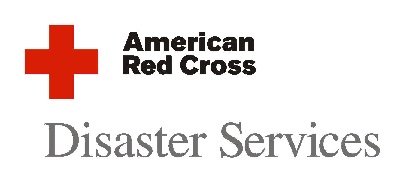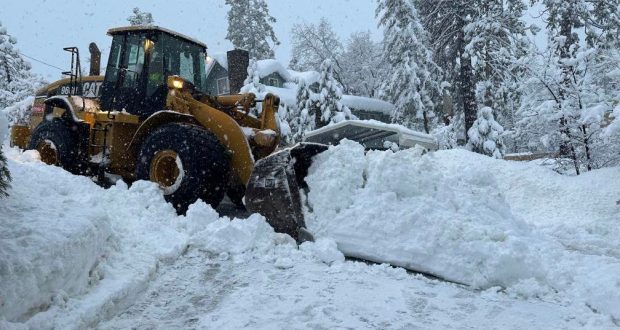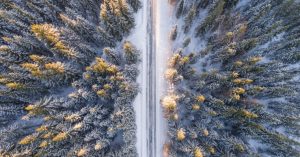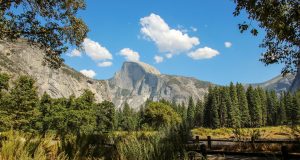
MOUNTAIN COMMUNITIES — Red Cross teams have been hard at work for the last ten days supporting mountain residents affected by extremely cold temperatures, dangerous winds, snow, ice, power outages, and road closures. In coordination with Madera and Mariposa County emergency officials, Red Cross disaster workers have been supporting warming centers and shelters, providing logistics support, meals, water, and supplies, as well as emotional care to more than 100 families since February 25.
Current Open Shelter: Small pets are welcome.
- Madera County: Oakhurst Community Center (39800 Fresno Flats Rd, Oakhurst, CA 93644) – Hours of Operation: 24/7
Current Open Evacuation Center: Small pets are welcome.
- Mariposa County: Mariposa Senior Center (5246 Spriggs Lane, Mariposa, CA 95338) – Hours of Operation: 9:00 a.m. – 6:00 p.m.
As road conditions improve, Red cross teams are also preparing to conduct mobile outreach this week across Madera and Mariposa counties to distribute relief supplies, including blankets, comfort kits, charging kits, shovels, pet food, and food boxes provided by our partners at Madera County Food Bank, Merced County Food Bank, and Central California Food Bank. On Friday, March 3, over 100 families received relief supplies through mobile outreach before the most recent storm came through. These supplies are also currently available at both Oakhurst Community Center and Mariposa Senior Center.
It takes a community of helpers during disasters, and we see the best of humanity in action. Special thanks to our partners providing resources at our shelters, including Central California Animal Disaster Team, Madera County Food Bank, Merced County Food Bank, Central California Food Bank, Madera County VOAD, Oakhurst Community Center, Oakhurst Rotary Clubs, Soup 4 Friends, Madera County Sheriff’s Foundation, Madera County Public Health, Madera County Health, and Human Services, Mariposa County Public Health, Mariposa County Health, and Human Services, Mariposa Senior Center, New Community United Methodist Church, PG&E and Sierra Tel, as well as generous in-kind donations from Ace Hardware, Advance Auto Center, Grocery Outlet, McDonald’s, Raley’s, Starbucks and Tractor Supply.
With additional storms on the horizon, be sure you’re Red Cross Ready by:
- Assembling an emergency preparedness kit.
- Creating a household evacuation plan that includes your pets.
- Staying informed about your community’s risk and response plans.
- Ensuring each family member knows how to get back in touch if you are separated during an emergency.
- Download the Emergency App for iPhone >> or for Android >>
Winter weather can bring life-threatening conditions. Stay indoors and wear layers of loose-fitting, lightweight, warm clothes. Visit here to learn how to keep your pipes from freezing.
- Check on relatives, neighbors, and friends, particularly if they are elderly or live alone.
- Avoid overexertion, such as shoveling snow, pushing a vehicle, or walking in deep snow.
- Caulk and weather-strip doors and windowsills to keep cold air out. Install storm windows or cover windows with plastic from the inside to provide an extra layer of insulation to keep cold air out.
- Make sure you have enough heating fuel on hand.
- If possible, bring your pets inside during cold winter weather. Move other animals or livestock to sheltered areas and ensure they have access to non-frozen drinking water. If the animals are outside, ensure their access to food and water is not blocked by snow drifts, ice, or other obstacles.
STAY SAFE OUTSIDE
Wear layered clothing, mittens or gloves, and a hat.
- Cover your mouth to protect your lungs from severely cold air.
- Keep dry. Change wet clothing frequently to prevent a loss of body heat. Wet clothing loses much of its insulating value and transmits heat rapidly away from the body.
- Stretch before you go out. If you go out to shovel snow, do a few stretching exercises to warm up your body. This will reduce your chances of muscle injury.
- Avoid overexertion, such as shoveling heavy snow, pushing a vehicle, or walking in deep snow. The strain from the cold and the hard labor may cause a heart attack. Sweating could lead to a chill and hypothermia.
- Walk carefully on snowy, icy sidewalks. Slips and falls frequently occur in winter weather, resulting in painful and sometimes disabling injuries.
- If you must go out during a winter storm, use public transportation if possible. About 70 percent of winter deaths related to ice and snow occur in automobiles.
WATCH FOR SIGNS OF HYPOTHERMIA AND FROSTBITE.
To avoid frostbite and hypothermia, be aware of the wind chill and dress appropriately.
- When outside, stay active to maintain body heat, take frequent breaks from the cold, and avoid unnecessary exposure to any part of the body.
- Drink liquids, such as warm broth or juice, but avoid caffeine and alcohol.
- Get out of the cold immediately if signs of hypothermia or frostbite appear. These signs include shaking uncontrollably, getting extremely tired, turning very pale, or getting numb fingers, toes, ears, or nose.
- To treat someone who may have hypothermia or frostbite, gently warm them by
wrapping them in a blanket and giving them warm drinks and high-energy foods. Call 911 if these signs are severe.
Use flashlights in the dark — not candles.
- Don’t drive unless necessary. Traffic lights will be out, and roads could be congested.
- Turn off and unplug any appliances, equipment, and electronics. When the power comes back on, surges or spikes can damage equipment. Leave one light on, so you’ll know when power is restored.
- Don’t be concerned about losing perishable foods if a power outage is two hours or less. During a prolonged outage, keep refrigerator and freezer doors closed as much as possible to protect your food. Use perishable food from the refrigerator first. Then, use food from the freezer. If the power outage continues beyond a day, prepare a cooler with ice for your freezer items. Keep food in a dry, cool spot, and always cover it.
- If you use a generator, keep it dry and don’t use it in wet conditions.
- Never use a generator, grill, camp stove, or other gasoline, propane, natural gas, or charcoal-burning device inside a home, garage, basement, or other partially enclosed areas. Keep this equipment outside and away from doors, windows, and vents, which could allow carbon monoxide to come indoors.
- Plug appliances directly into the generator. Never plug a generator into a wall outlet.





